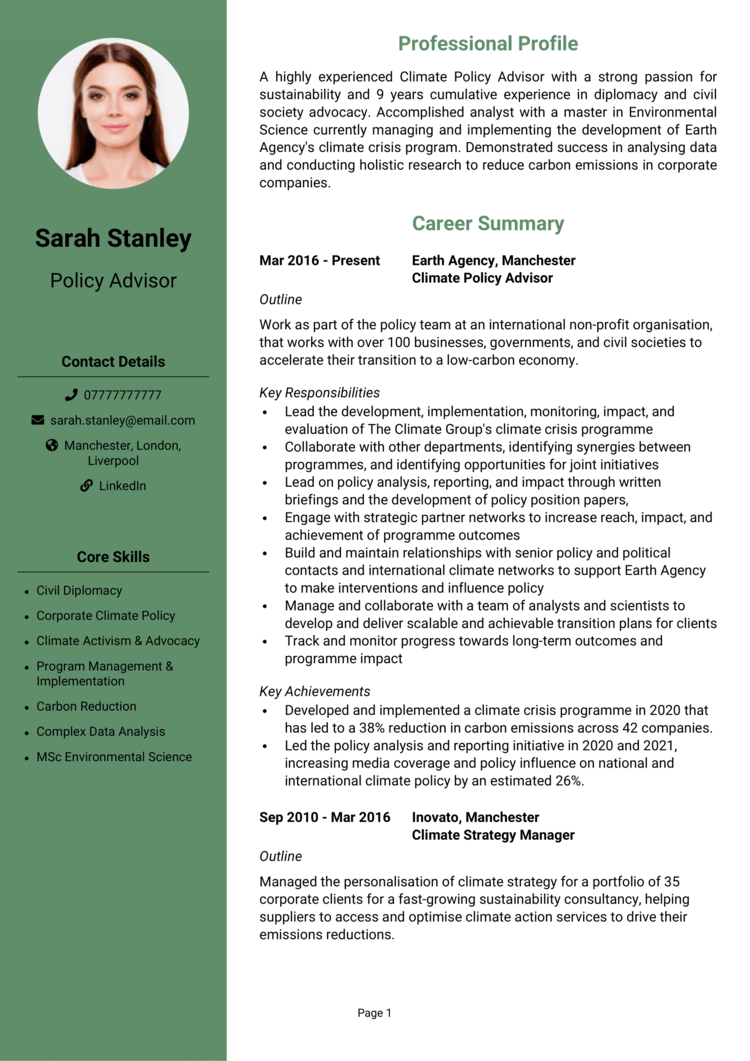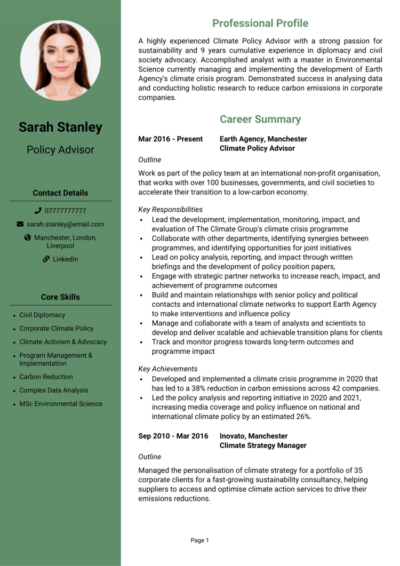You’ve shaped proposals and turned complex legislation into plain English. But now it’s time to tackle one of the hardest policies to write – your own CV.
This guide will help you present your expertise clearly, using a Policy Advisor CV example and tailored guidance to help you land interviews. You’ll learn how to show off your experience in a way that speaks to decision-makers and hiring panels alike.
Policy Advisor CV sample

How to write your Policy Advisor CV
Discover how to craft a winning Policy Advisor CV that lands interviews with this simple step-by-step guide.
Policy professionals spend their time writing strategies and summaries for everyone else – which makes writing about themselves all the more difficult. But writing a CV effectively is essential if you want to influence not just policy, but your own career direction.
This guide walks you through each section step-by-step, helping you showcase your research ability and strategic thinking in a way that’s as persuasive as your policy recommendations.
How should you structure and format a Policy Advisor CV?


A good policy paper needs structure, and your CV should follow suit. The clearer and more focused the layout, the easier it is for a recruiter to spot the insight and impact behind your work. A messy structure or avoidable mistakes will cost even the most qualified candidates the opportunity, so keep things clear for the recruiter.
Here’s the layout to follow:
- Name and contact details – Keep these personal details at the top so a potential employer can reach out to you.
- Profile – Immediately draw in the recruiter with a brief summary of your skills and experience.
- Core skills – Briefly highlight those qualities which make you the best candidate.
- Work experience – List your previous roles in reverse chronological order, with your most recent first.
- Education – List the qualifications and certificates that make you the right fit.
- Additional info – You can optionally list any relevant hobbies and interests which help to convey your fit for the role.
Stick to a clean, professional font and divide your sections with bold, easy-to-scan headings. Use bullet points to break down text – avoid long paragraphs that bury your best achievements. Keep everything under two pages in length and make use of white space to keep the document from feeling dense. A clear format helps show that you communicate well and can make complex information accessible – a skill you’re likely selling in the role itself.
Writing a Policy Advisor CV profile


This section is your short elevator pitch – a brief paragraph at the top of your CV that quickly tells recruiters why you’re a strong candidate. It’s not just a summary of what you’ve done, but a snapshot of the expertise and value you’ll bring to a policy team.
Your CV profile should position you as a clear, credible voice with experience in delivering analysis and advice that makes a real impact.
Policy Advisor CV profile examples
Profile 1
Experienced Policy Advisor with over eight years of experience shaping legislative proposals and government initiatives within public sector departments. Skilled in policy research, stakeholder engagement, and impact assessments. Proven ability to translate complex data into actionable policy recommendations.
Profile 2
Analytical Policy Advisor with six years of experience working within NGOs and regulatory bodies. Strong track record in drafting policy briefs, advising on legal compliance, and coordinating consultations. Committed to evidence-based policymaking and cross-sector collaboration.
Profile 3
Detail-oriented Policy Advisor with five years of experience supporting education and social policy initiatives across national and regional authorities. Experienced in writing internal reports, evaluating programme outcomes, and briefing senior decision-makers on emerging trends.
Details to put in your Policy Advisor CV profile
Include the following:
- Where you worked – Summarise the environments you’ve worked in, such as government departments, NGOs, or policy consultancies.
- Your top qualifications – Mention any degrees or training in public policy, law, economics, or a related field.
- Essential skills – Touch on your research ability, written communication, and policy development experience.
- Policy areas – Briefly mention the topics or sectors you’ve worked in, like healthcare, education, climate, or economic policy.
- Value delivered – Explain how your work has contributed to better decisions, informed legislation, or improved services.
Writing an effective core skills section


For a Policy Advisor role, this section should reflect the core competencies that hiring panels are actively searching for – from analysis to stakeholder management. Keep your focus on tangible, demonstrable CV skills that can be tailored to each job application.
This section should serve as a quick reference point. Keep it concise, well-aligned with the role, and always make sure it reflects the language used in the job description. That way, recruiters can see at a glance that you match the brief.
The top skills to highlight in your Policy Advisor CV
- Policy Research and Analysis – Conducting in-depth research on social, economic, or regulatory issues to inform evidence-based policy development.
- Stakeholder Consultation and Engagement – Gathering input from industry experts, government bodies, and the public to shape and refine policy proposals.
- Briefing and Report Writing – Preparing concise and informative policy briefs, reports, and recommendations for senior decision-makers.
- Legislative and Regulatory Review – Analysing existing laws and regulations to assess policy implications and ensure alignment with new proposals.
- Impact Assessment and Evaluation – Assessing the potential outcomes, risks, and costs of policy options using data and modelling techniques.
- Strategic Advice to Leadership – Advising ministers, executives, or senior officials on policy direction and political or operational feasibility.
- Cross-Government and Interagency Coordination – Collaborating with departments, agencies, and partner organisations to align policy efforts.
- Monitoring and Implementation Support – Tracking policy rollouts, gathering feedback, and recommending adjustments to maximise effectiveness.
- Speech and Briefing Note Preparation – Drafting speeches, parliamentary responses, and talking points for use in public or legislative forums.
- Political and Economic Trend Analysis – Monitoring the broader policy landscape and emerging trends to anticipate challenges and opportunities.
Showcasing your work experience


Your work experience section is the real backbone of your application – especially in a role like this, where outcomes often matter more than titles. Use this space to show how your analysis, communication, and influence have driven change or supported complex policy goals.
List your roles in reverse chronological order. Begin each one with a short summary of the organisation and your remit. Then use bullet points to detail your responsibilities and achievements – from producing briefings and reports to consulting with stakeholders or evaluating policy effectiveness.
Writing job descriptions for past roles

- Outline – Introduce the organisation and explain the scope of your role. Mention the policy areas you worked on and the type of advice or outputs you were responsible for.
- Responsibilities – Use action words like “drafted” and “advised.” For example: “drafted parliamentary briefings for education reforms” or “advised department leads on regulatory changes.”
- Achievements – Highlight the difference your work made. Show how your input influenced decision-making, shaped legislation, or improved programme delivery. If you’ve got numbers (e.g. funding allocated, engagement rates, policy adoption), use them.
How to present past roles for Policy Advisors
Policy Advisor | Department for Education
Outline
Provided policy development and analysis support for national education initiatives, focusing on post-16 reform and funding allocations.
Responsibilities
- Drafted policy papers, consultation responses, and ministerial briefings
- Undertook quantitative and qualitative research to support evidence-based policy
- Engaged with stakeholders including local authorities and education providers
- Monitored legislation and ensured alignment with wider departmental goals
- Supported cross-team collaboration during programme design and rollout
Achievements
- Contributed to successful development of a £100m funding proposal
- Reduced internal policy paper review time by 25% through formatting templates
- Recognised by senior officials for clear and concise briefing notes
Policy Advisor | Centre for Public Health Strategy
Outline
Supported the development of policy recommendations on health inequalities and regional service access for a public health think tank.
Responsibilities
- Conducted policy research using academic journals, health datasets, and FOI responses
- Co-wrote public-facing reports and internal briefings on regional health outcomes
- Attended cross-sector meetings and captured policy insights for strategic use
- Reviewed draft policies and assessed alignment with health equity goals
- Maintained strong relationships with local authorities and healthcare providers
Achievements
- Helped shape a local authority’s public health action plan for 2023–2025
- Co-authored a report featured in national health policy publications
- Led stakeholder interviews that enhanced the evidence base for recommendations
Policy Advisor | Green Futures Advocacy Network
Outline
Advised on environmental and climate policy strategy for an independent policy and research organisation with a focus on energy transition.
Responsibilities
- Analysed emerging legislation related to sustainability and energy reform
- Drafted position statements, consultation responses, and advocacy materials
- Coordinated policy roundtables and stakeholder workshops
- Synthesised research findings into policy briefs for use by campaign teams
- Worked with communications team to ensure consistency of public messaging
Achievements
- Supported publication of a report that influenced national net-zero planning
- Increased policy engagement at stakeholder events by 40% through new outreach
- Contributed to a joint campaign adopted by five regional advocacy groups
Highlighting your education


Your education provides the foundation for your analytical and policy development skills. List your highest or most relevant qualifications, especially if they’re in public policy, law, economics, international relations, or social sciences.
You don’t need to list every subject studied – just ensure it’s clearly written and positioned logically. If you’ve done any specialist training (e.g. in legislative drafting or policy evaluation), include that too.
The best qualifications to boost a Policy Advisor CV
- BA or MA in Public Policy or Politics – A strong academic foundation for government or NGO roles
- MSc in Economics or International Relations – Valuable for roles focused on macro policy or global development
- GCHQ or Civil Service Fast Stream courses (UK) – Well-regarded training routes for public sector policy professionals
- Postgraduate Diploma in Law (PGDL) – Helpful for policy work involving legislation, rights, or regulatory advice
- Short courses in impact evaluation, policy writing, or public finance – Shows targeted professional development





